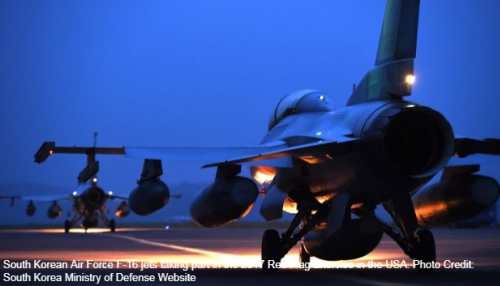- News>
- World
360 shots, 20 flares: How South Korea`s F-15 and F-16 fighters warned Russian warplane violating its airspace

However, South Korea did not clarify if the shots and flares were fired by its F-15 jets or the F-16. The Russian and Chinese warplanes were undertaking a joint patrol in a sign of their growing bonhomie and assertiveness. The incident took place near South Korea`s easternmost islets of Dokdo above the East Sea.
South Korean Air Force fighters on Tuesday warned the Russian military aircraft which had allegedly entered their airspace by firing 360 warning shots and 20 flares from a distance of about one kilometre. The South Korean F-15s and F-16s were scrambled twice within a space of a few minutes to intercept a Russian A-50 early warning and control aircraft which had violated its airspace at 9:09 local time (5:39 am Indian Standard Time) and then again at 9:33 am (6:03 IST) on Tuesday.
According to South Korea's Yonhap News Agency, the fighters first warned the Russian A-50 by firing 80 warning shots and 10 flares forcing the plane to leave the Korean airspace. However, when the Russian warplane once again entered the South Korean airspace at 9:33 am, the jets took a more aggressive stand by firing around 10 flares and 280 warning shots, a Joint Chiefs of Staff (JCS) officer said.
"The Air Force instantly deployed multiple jets, including F-15Ks and F-16Ks, and sent warning messages to it in accordance with operation manuals. But the plane did not respond, so one of our aircraft fired some 10 rounds of flares and 80 warning shots. The Russian aircraft then left the airspace after three minutes, and finally flew out of KADIZ at around 9:15 am. At around 9:33 am, however, it again encroached upon South Korean airspace. Following stronger military actions involving around 10 flares and 280 warning shots, the aircraft left the airspace four minutes later. It finally flew out of the air defense zone at 9:56 am," the officer was quoted as saying by Yonhap.
However, South Korea did not clarify if the shots and flares were fired by its F-15 jets or the F-16. The Russian and Chinese warplanes were undertaking a joint patrol in a sign of their growing bonhomie and assertiveness. The incident took place near South Korea's easternmost islets of Dokdo above the East Sea.
According to South Korea, the aerial engagement came soon after two Tu-95 Russian bombers and two Chinese H-6 aircraft entered Korea's Air Defense Identification Zone (KADIZ) without identifying then plane or advance notice.
Later Russia expressed "deep regret" over its warplane entering South Korea's airspace and assured an investigation into the transgression. Yonhap reported that South Korea's presidential office said on Wednesday that Russia had notified the government that its military aircraft had violated the airspace unintended, probably due to a technical glitch.
